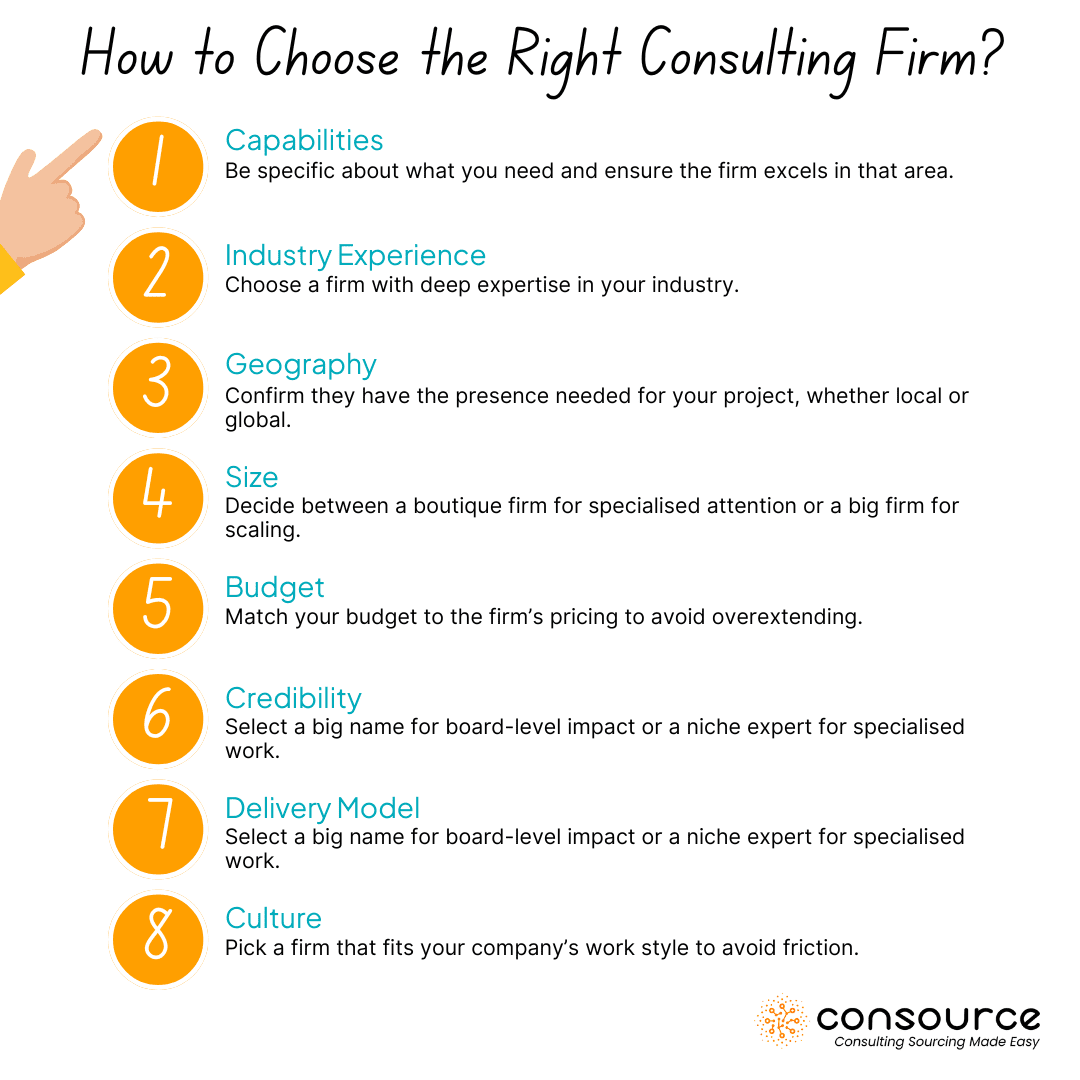Short answer: No. But why exactly?
The recent NHS Test & Trace scandal involving Deloitte is still fresh in the minds of many, and for good reason. Executives are growing increasingly frustrated with soaring consulting costs, junior teams that lack insight, et le lack of actionable recommendations. And yet, despite all these frustrations, should you really cut ties with the top consulting firms?
The truth is, no—you shouldn’t. But you do need to be smarter about how and when you work with them. Large consulting firms like McKinsey, Bain, et the Big Four didn’t build their reputations on bad results. They are very good at what they do. But, and this is the key, they are only good at specific things. As firms have expanded aggressively into new areas like digital marketing et data analytics, they’ve started to lose their grip in other areas where they lack the necessary depth.
So, should you stop working with top firms? Not entirely. What you need is a much clearer understanding of when it’s time to use them—and when it’s smarter to look elsewhere.
The Consulting Market: Rich, Diverse, and Misunderstood
Let’s start with the basics: There are roughly 10,000 consulting firms globally, representing 250,000 consultants—not including the independent consultants. The consulting landscape is rich and incredibly diverse, far more complex than just “big vs. small” or “expensive vs. affordable.”
As a general rule, large consulting firms aimer McKinsey, Bain & Company, et Booz Allen tend to operate as one-stop shops. They provide a full range of capabilities across most industries and geographic regions. These firms can handle everything from corporate strategy à technology implementations et organizational transformations. Their size and scope are massive, which makes them incredibly appealing for large-scale, multi-disciplinary projects.
Meanwhile, smaller firms et boutiques often focus on one or two specific dimensions—a niche in which they excel. These firms might only handle supply chain optimisation, gestion du changement, ou alors leadership development, but they do so with deep expertise and a senior team that works closely on each project.
But here’s the thing: Most procurement executives only view the market through the lens of capability ou industry expertise. They either go for the big guys who cover everything or focus on a firm specialized in a particular capability or sector. However, this is not the only way to assess the market. You can—and should—consider multiple dimensions when choosing the right consulting partner.
The consulting market can be evaluated in various ways, including strategic vs. operational, hard vs. soft capabilities, and even by firm culture—global vs. local ou blue chips vs. SMEs. Diagnosis Experts might be great at analysis, while Implementation Specialists shine when it comes to execution. The reality is that most firms, even the big ones, are only present on part of the spectrum. The key is to find the firm that matches your specific needs. Trust me, whatever your problem is, there’s a firm out there that specializes in it.
Where Top Consulting Firms Excel
Here’s the reality: Top consulting firms are not omniscient—they don’t know everything, and they certainly aren’t good at everything. But when you engage them on their turf, they can absolutely transform your business. The trick is figuring out exactly where that turf is.
Let’s be clear: the big firms aimer McKinsey, BCG, et Bain built their reputations on high-stakes, high-level strategy work. They excel when they’re dealing with large-scale transformations, mergers, corporate restructuring, and other complex projects that involve a top-down overhaul. These are executive-level projects that require deep insights, big ideas, and the ability to reshape entire organizations.
Take McKinsey’s role in General Electric’s transformation under Jack Welch. McKinsey didn’t just help GE; they reshaped it into a leaner, more aggressive version of itself. That kind of deep, structural transformation is where these firms shine. Or think of BCG’s work with IKEA. BCG didn’t just tweak IKEA’s supply chain—they re-engineered it, helping IKEA become one of the world’s most efficient retailers. These firms aren’t just playing with ideas—they’re reshaping entire industries.
But here’s the catch: That territory is shrinking. As these firms have expanded into new areas—like digital marketing ou AI-driven analytics—they’ve started to stretch themselves too thin. When you engage them for their core strengths, like corporate strategy ou large-scale transformation, you’re in good hands. But if you ask them to handle your procurement optimization or to revolutionize your employee engagement strategy, you’re likely to see diminishing returns—and a hefty bill.
The reason? They’re not built for the operational grind. Sure, McKinsey or Bain might pitch you on cost-cutting or day-to-day operations, but that’s not their sweet spot. You’ll end up with flashy models et high-priced PowerPoint decks, but they probably won’t get their hands dirty in the way you need. That’s where boutique firms often outperform. In these areas, smaller firms tend to provide deeper insights et better value at a fraction of the cost.
Don’t Treat Consultants as Commodities: Consulting Is About People
Here’s a mistake I see all the time: companies treat consulting firms like they’re commodities. As if one McKinsey consultant is interchangeable with a Deloitte consultant, or worse, as if you can just swap a boutique firm for a big-name firm and expect the same results. Spoiler alert: Consulting doesn’t work like that.
Consulting is about people—and let me be blunt—some consultants are just damn good, while others? Not so much. The brand behind them matters, sure, but the individuals actually doing the work for you? They matter a whole lot more.
Think about it: You can hire BCG and get an amazing senior partner who’s spent decades shaping entire industries, or you could end up with a junior consultant fresh out of business school, someone who’s learning on the job at your expense. The difference between those two is night and day—and if you’re not paying attention to who is on your team, you’re setting yourself up for failure.
Most firms, especially the big ones, have a nasty habit of parading their top talent to sell you on the project. They’ll bring in the senior partners to close the deal, and once the contract’s signed? The junior team takes over. You’re left with bright, ambitious consultants who, no doubt, work hard—but lack the experience et insight to drive real, nuanced solutions.
So how do you avoid this trap? Easy: Demand transparency. Don’t just look at the firm’s reputation. Insist on seeing the actual profiles of the consultants who will be on the ground working for you. Who are they? What have they done before? Do they really understand your industry? If they don’t, you’re paying premium prices for subpar execution.
Here’s the thing: consulting is a human-to-human service. The firm’s logo might give you some comfort, but logos don’t do the work. People do. And if the people assigned to your project aren’t the right fit—if they don’t have the industry knowledge, the track record, or the ability to grasp the complexity of your challenges—you’re not going to get the results you need.
The truth is, you’re not hiring a firm; you’re hiring individuals. A firm’s brand is only as good as the consultants behind it, and those consultants? They’re not all created equal. Some are simply better. Some understand your business in ways others can’t. Find those people, and you’ll get more value than any big-name reputation can guarantee.
In the end, the firm you choose matters far less than the people they assign to your project. So, don’t settle for mediocrity. Demand the best people—because, trust me, some consultants are worth every penny, while others will just leave you with expensive PowerPoints and an empty budget.
In short, if you’re hiring a top consulting firm to reshape your business at the highest level, you’re making the right call. But if you’re expecting them to optimize your operations ou fix your HR issues, you might want to reconsider. Stick to their core competencies, and you’ll get what you’re paying for. Venture too far out of their lane, and you’ll be left with a glossy report and a serious case of buyer’s remorse.
Don’t Underestimate the Importance of Political Value
Here’s something that most executives won’t openly admit: Sometimes, hiring a big-name consulting firm isn’t just about solving problems. It’s about politics. In the world of high-stakes projects, boardroom scrutiny, and media attention, hiring a top-tier consulting firm like McKinsey, BCG, ou alors Deloitte can be less about what they deliver and more about the optics.
Let’s be real—sometimes it’s not about getting the best solution, it’s about covering your bases. Imagine you’re leading a high-profile project—something with shareholder visibility, something that could make or break your career. Do you want the right solution, or do you want a bulletproof choice that no one can argue with?
Hiring a big-name firm gives you political capital. It’s a defensive move, one that says, “Look, we hired the best. If things go wrong, it’s not on me—it’s on them.” You see this play out all the time. Think back to Andrew Cuomo’s decision to bring in McKinsey during the COVID-19 crisis. Was McKinsey the most qualified to handle a public health emergency? Maybe, maybe not. But hiring them gave his response an air of legitimacy that would’ve been harder to achieve with a smaller, lesser-known firm.
In corporate settings, it’s the same game. When a project is high-profile, politically charged, or facing intense scrutiny, the brand name of the consulting firm you hire can act as a shield. Whether it’s mergers, restructuring, ou alors cost-cutting measures, bringing in a top consulting firm signals to the board and shareholders that you’re serious. It shows you’ve hired the “best in the business,” and it takes some of the heat off you.
And if things go south? At least you can say you brought in the heavy hitters. No one’s going to crucify you for hiring McKinsey ou Bain if the project fails. It’s a safe bet in a world where executives are always balancing risk with reputation.
But here’s the caveat: Political value can’t be the only reason you hire a consulting firm. If your project needs genuine expertise, hiring a big name just to protect yourself from scrutiny won’t cut it. The optics might look good in the short term, but if you’re not getting the right expertise, the project will crash and burn anyway. And no amount of brand prestige can save you from that.
So, while it’s smart to leverage political value when necessary—especially on projects with high visibility or sensitive stakeholders—don’t let that be the only reason you make the hire. Political cover has its place, but the results still matter. Play the political game, but don’t forget you need real, tangible results to justify the move. Optics can buy you time, but expertise is what gets the job done.
How to Choose the Right Consulting Firm: Define Your Consulting DNA and Start Hunting
So, how do you pick the right consulting firm? It starts by defining the Consultation de l'ADN of your ideal partner. Here’s how you do it:

- Capabilities: Know What You Need Start with what your project really requires. Is it strategy? Operations? Tech integration? Make sure the firm excels in exactly what you need, rather than trying to sell you on their ability to do everything. Be specific.
- Industry Experience: Do They Get Your World? Do they have real experience in your industry? If you’re in Oil & Gas, for example, don’t settle for a firm that “dabbles” in energy. You want people who know your challenges inside out.
- Geography: Can They Be Where You Need Them? Do they have the local or global presence your project requires? If geography matters—whether for culture, language, or simply logistics—make sure they have people on the ground.
- Size: Bigger Isn’t Always Better A boutique firm might bring you more senior-level talent at a lower cost. If your project is complex and fast-paced, a big firm can scale quickly, but sometimes, smaller is sharper.
- Budget: Be Realistic Know what you can afford. Big firms cost big money. If your budget is tight, don’t chase a top-tier firm just for the name—find the best fit for your price.
- Credibility: Sometimes the Brand Matters If your project needs board-level approval or political cover, a big name can help. But if you’re seeking niche expertise, go with the thought leaders in that area.
- Delivery Model: Strategy or Execution? Decide if you need a firm to design a strategy ou stick around for implementation. Most firms specialize in one or the other, so make sure their approach aligns with your project’s needs.
- Culture: Do They Fit? A firm might check all the boxes, but if their work style clashes with your company’s culture, it’s going to be painful. Find a partner that gets your team and how you operate.
Once you’ve nailed down your Consultation de l'ADN, it’s time to start looking. Use internal and external networks to find firms that fit the bill. Remember, the right choice could be a top-tier firm or a boutique specialist. What matters most is finding the firm that fits your project’s specific needs—not just the one with the biggest name.
Conclusion: It’s Not Either/Or—It’s About Choosing Wisely
So now you’ve got the long answer: No, you shouldn’t stop working with top consulting firms. They can deliver outstanding results on the right projects, and when they do, they’re absolutely worth every penny. But the key here is net value. When a consultant costs you €2M but delivers €50M in value, it’s worth it. Compare that to one who costs €800k but only delivers €20M—the math is obvious.
What I’m advocating for isn’t a black-and-white choice between big firms ou boutiques. It’s not an either/or decision. It’s about understanding that it depends. It depends on the specific needs of your project, the expertise required, and the value you expect in return.
The takeaway? Choose wisely. Make decisions based on a clear and informed process, define the Consultation de l'ADN you need, and match that to the right firm—whether it’s a top-tier global powerhouse or a highly specialized boutique. In the end, the best consulting partner is the one that delivers the most value for your business.
Questions Fréquemment Posées
1. How can I ensure I’m getting value from a top consulting firm?
To get value from top consulting firms, focus on engaging them for their core strengths, such as high-level strategy, large-scale transformations, or executive-level projects. Always demand transparency regarding the consultants assigned to your project and ensure their expertise matches your industry needs.
2. Are boutique consulting firms better than the big players like McKinsey or Bain?
It depends on the project. Boutique firms often provide specialized expertise and more senior-level involvement, making them better suited for niche projects or hands-on operational work. In contrast, large firms excel in complex, high-stakes projects that require strategic overhaul and broad organizational change.
3. What should I consider when hiring a consulting firm?
Key factors include the firm’s capabilities, industry experience, geographic presence, budget, credibility, and cultural fit with your organization. Define the “Consulting DNA” of your ideal partner based on what your project requires—whether it’s strategy, execution, or a combination of both.
4. Why do big companies continue to hire expensive consulting firms despite criticism?
Often, hiring top consulting firms is about more than just solving problems—it’s about optics and political value. In high-profile projects, having a reputable firm like McKinsey or Deloitte on board can provide credibility and protect executives from criticism if things go wrong.
5. Is it possible to avoid high consulting fees and still get quality results?
Yes, it’s possible. Smaller, specialized firms often deliver deeper insights at a lower cost, especially for projects that require hands-on execution or niche expertise. By carefully defining your project’s needs and exploring the broader consulting landscape, you can find a cost-effective partner without compromising on quality.
6. How do I avoid ending up with junior consultants who lack experience?
Demand transparency during the hiring process. Insist on knowing the backgrounds of the consultants who will be working directly on your project. This can help ensure you’re not just paying for the brand name but getting seasoned professionals who can deliver real value.
Pour en savoir plus sur les meilleures pratiques en matière d'achat de services de conseil, consultez l'article de Consulting Quest intitulé Comment acheter des services de conseil comme un professionnel. Il fournit des informations utiles pour vous aider à maximiser la valeur de vos missions de conseil.








0 commentaires